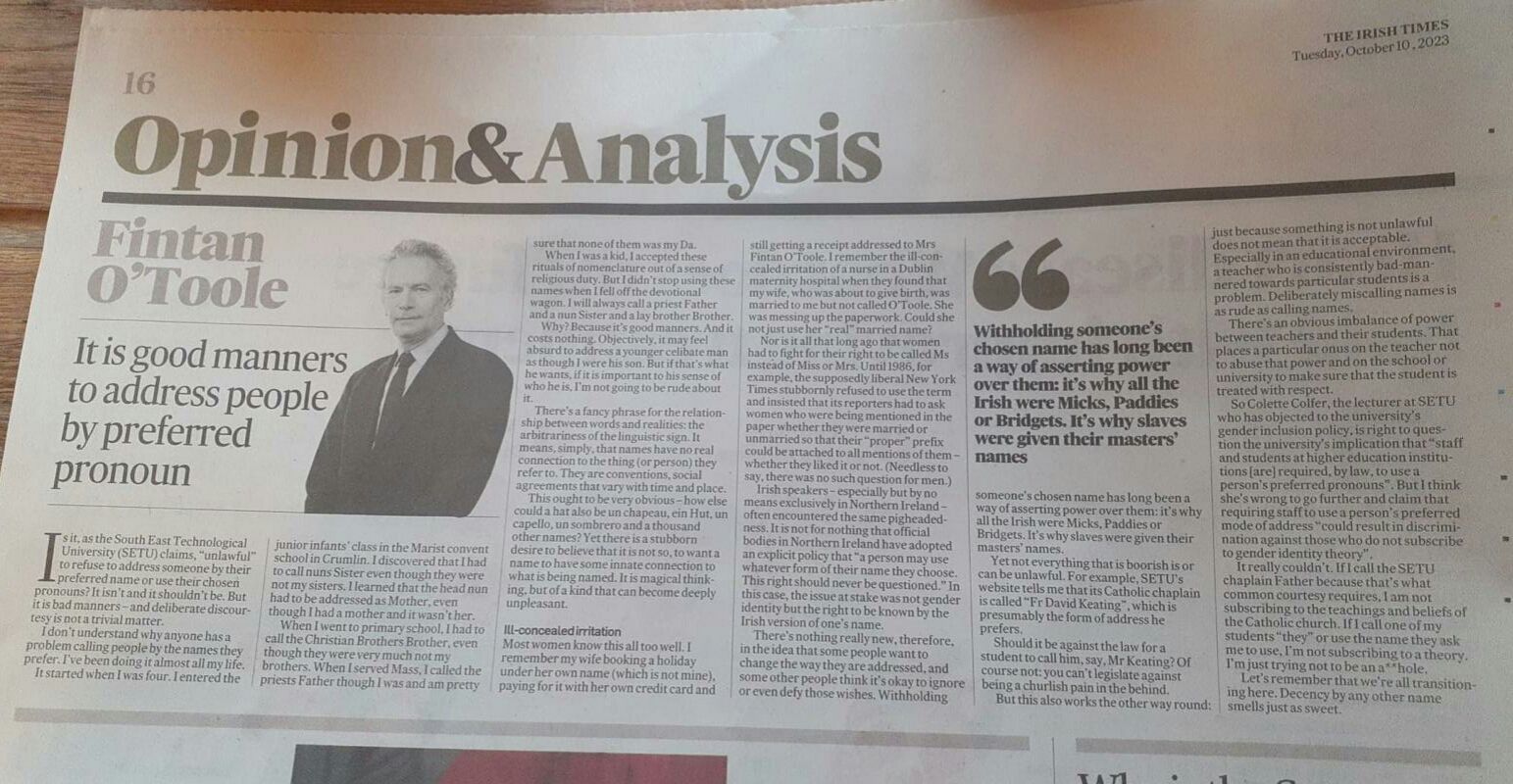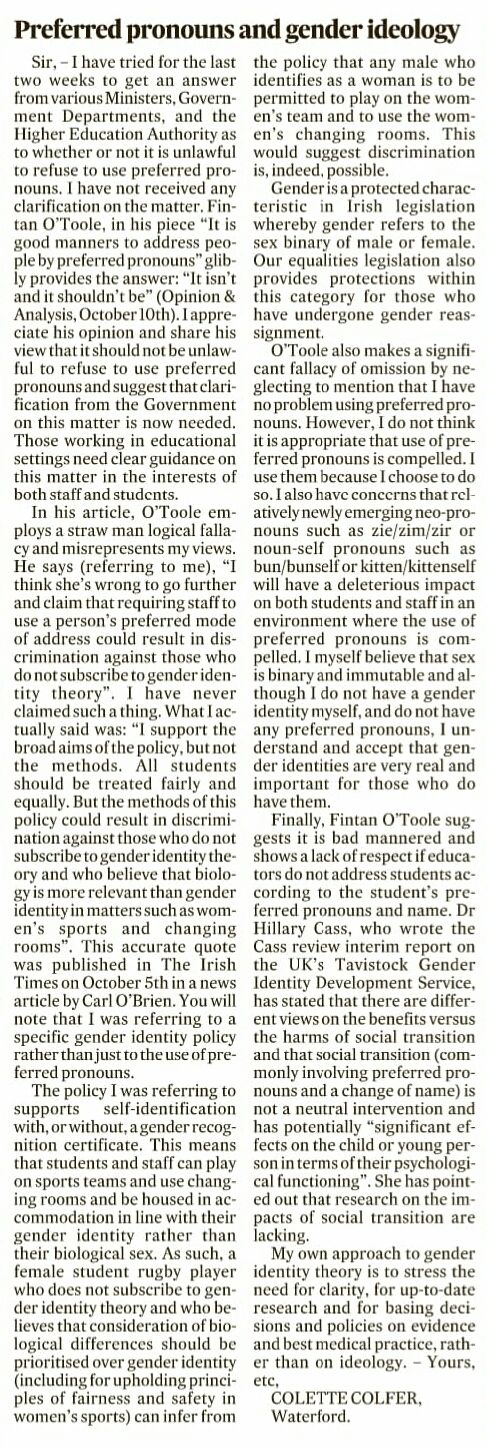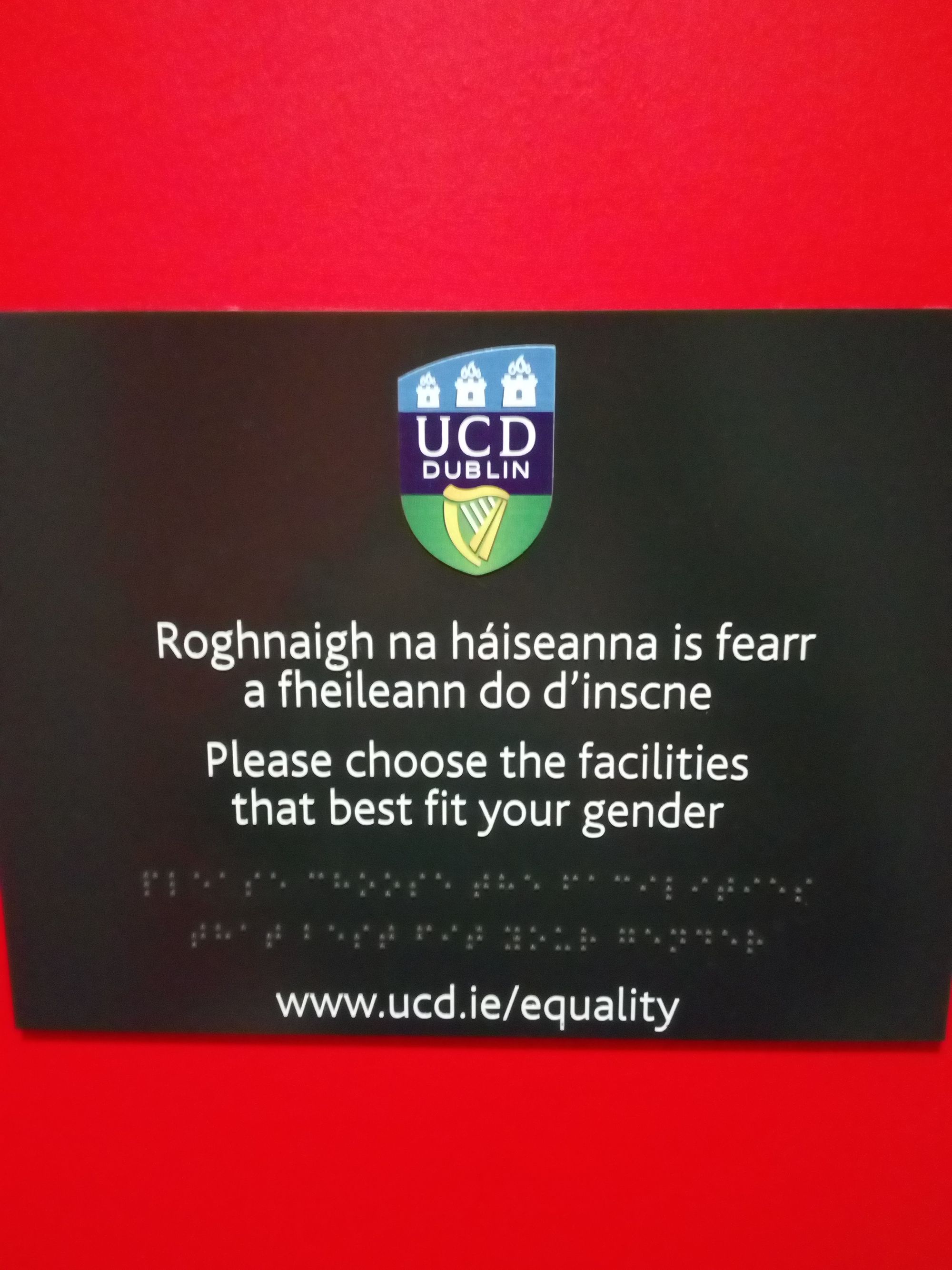Colette Colfer's courageous stance in objecting to the South East Technological University's new gender identity and expression policy was reported in The Irish Times on Thursday of last week:
:quality(70):focal(235x148:245x158)/cloudfront-eu-central-1.images.arcpublishing.com/irishtimes/USKJL7LUJBAC7P4YOU4JNXCZD4.jpeg)
“Are all staff and students at higher education institutions required, by law, to use a person’s preferred pronouns? Is it legal for a higher education institution to dictate to staff and students that they must do this?” she said.
“I have sent them an email and said in writing that I will not agree with being compelled. I know there are other staff who feel the same way, but the level of fear is enormous. They fear for their jobs and careers. I know that. Some are too nervous to even express it in an email.”
On Monday this week Colette Colfer said:

"Gript emailed the five third level institutions referred to, and gave them almost 24 hours to respond to the query as to whether they stood over their published claims regarding the legal situation in the light of 'the remarks by An Taoiseach last Friday that he could not imagine the state prosecuting any person for “using the wrong pronouns.'
Or whether, alternatively, their published policy is in fact designed to 'comply with the criteria set out by Advance HE in their Athena SWAN charter?'"
But prior to publication of Gript's piece on Tuesday it reported that none had.
On Tuesday also columnist Fintan O'Toole replied in an opinion piece:
"Withholding someone's chosen name has long been a way of asserting power over them.." he wrote.

A selection of the responses which were prompted by O'Toole's piece were published on Wednesday in The Irish Times:

Tracy Dempsey (@TracyDempsey) published on X (formerly Twitter) her letter which wasn't one of those published by the newspaper. It's also worth reading so published here:
Dear Sir,
Fintan O’Toole‘s homily exhorting women to “be courteous” to men by going along with their colonisation of our language, spaces and sex class was entirely in keeping with a long history of abusive coercive control of women in Ireland, both sides of the border.
His ponderings about figurative titles and names did nothing to address the issue in question: attempts, with varying degrees of force, to corrupt basic rules of grammar relating to third-person pronouns, which in English - and Irish - correspond with sex, when the sex of the person is known. “Misgendering” is Orwellian doublespeak.
It used to be common knowledge that referring to oneself in the third person is a sign of narcissism. In this most narcissistic age, it has become normalised for people to pick and choose third-person pronouns and declare “these are my pronouns”. As if one can own the building blocks of grammar, or customise them on a whim.
But the real issue is much more serious than that, more serious even than the “compelled speech” argument being bravely made by Colette Colfer.
Sex, like age, is a fundamental risk factor for safeguarding; this is well understood. 99% of of sexual offenders are male; 88% of sexually offended against are female, according to prison data from the North. More than 99% of sexual offenders are male; while 83% of those recorded as victims of rape and sexually assault last year were female in the South.
Using sex-deceptive pronouns is a fundamental breach of safeguarding, for which we all in society are responsible, and for which universities, governments and public bodies have particular statutory responsibilities.
Using wrong-sex pronouns dehumanises women, signals solidarity with autogynephiles (men who are sexually aroused by pretending to be women, and coercing non-consenting people to play along) over their partners and children. It perpetuates the snake oil marketing of “sex change” (impossible) that is driving the psychological and medical abuse, sterilisation and amputations of children and vulnerable adults with histories of trauma, comorbid mental health issues, internalised homophobia in Ireland and everywhere else lobbyists have been hard at work.
The real story here is how a constellation of NGOs staffed by activists unqualified in child development, medicine, etc have been granted such outsize influence - and public funding - over the Irish and Northern Irish governments and civil service. If the Irish Times would like to cover this, many of us women can share whistleblower testimony and hopefully prompt the necessary public enquiries and remedy needed to restore safeguarding.
Yours,
Tracy Ní Dhíomasaigh (Ms), Contae Dhoire
Colette Colfer's response to Fintan O'Toole was published on Thursday:

On Friday Newstalk Breakfast Minister for Justice Helen McEntee responded by saying refusing to use pronouns is not illegal – and it will not be illegal under the new Hate Crime legislation she is currently bringing through the Oireachtas.
When it was put to her that the university’s statement is incorrect, she said: “What a university decides to do is separate to what the law may or may not be”.
“At the moment it is not unlawful and I'm clear about that,” she said. “If we introduce this law, it won't be.
The Sunday Independent today published Colette Colfer's response to columnist Eilis O'Hanlon's piece last week "Are we now required by law to just believe what others think?":


How should we characterise the attempt to force people to acknowledge others as the sex they are not by using their "preferred pronouns" - the pronouns which don't correspond to their sex?
And when will the five colleges apologise and withdraw their erroneous policies?


